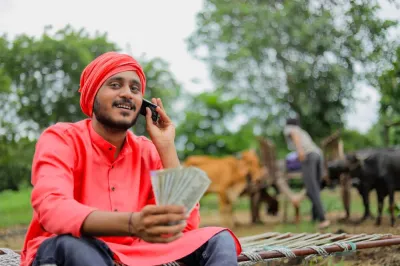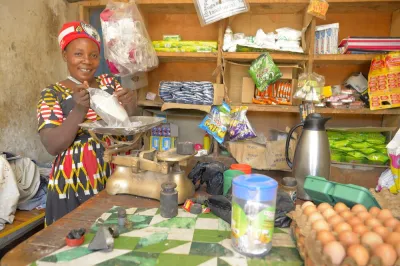FinDev COVID-19 Update | 10 - 23 Sep 2020
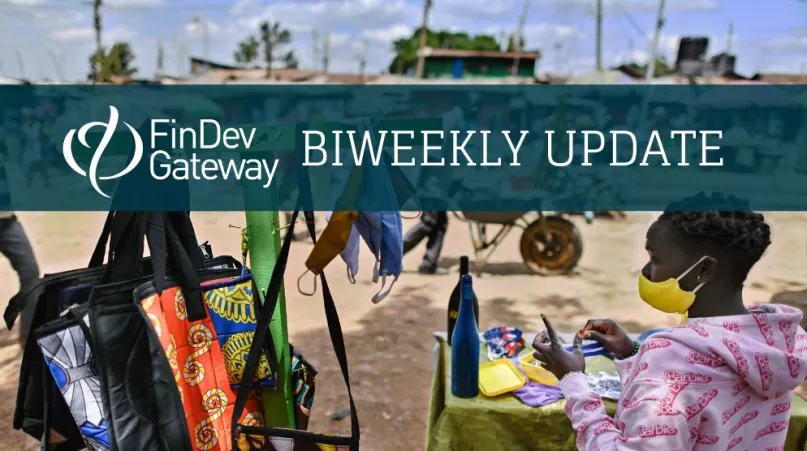
FinDev Gateway has created this COVID-19 Update with the latest and most relevant knowledge resources for financial inclusion. Sign up to receive this update to your inbox.
If you have content to share in our COVID-19 update, please submit here or contact us directly.
Do you find the FinDev Update useful? Take a moment to let us know >>
Global
- The COVID-19 pandemic is highlighting the need for better customer protection as pressure on borrowers to repay loans is increasing; borrowers from Pakistan to India, Cambodia, and Kenya have reported experiencing pressure from lenders to repay. While customer protection principles exist, more specific guidance is needed on responsible measures MFIs can take during a global pandemic.
- Countries are taking a range of measures to help small businesses during COVID-19, with short-term finance being the most commonly used measure, according to a World Bank analysis. Lower-middle income countries rely on tax-based measures, whereas high and upper-middle income countries have focused on job retention measures such as wage subsidies and cash transfers.
- Donors can play an important role in making social assistance payments more efficient and secure. A new CGAP COVID-19 briefing highlights specific measures donors can take to help build strong payments systems, from supporting gender-sensitive payments methods, to advocating for or cash-in/cash-out network development, and facilitating knowledge exchange among countries.
Asia
- Migrant workers from Asia’s developing economies have been sending record amounts of money home during the pandemic, defying earlier predictions of steep drops in remittance flows. However, experts in the region believe a crash is still on the horizon due to the economic decline in Middle Eastern host countries and the end of temporary COVID-19 support measures which may have bolstered remittances initially.
- New M-CRIL Advisory Notes on MFI liquidity in Cambodia and Pakistan illustrate the wide range of experiences in the region. The reports show that the Cambodian microfinance sector has not been substantially impacted by COVID-19, while microfinance banks in Pakistan have faced severe challenges in repayment collections. Data from the Pakistan Microfinance Network shows that new lending fell by over 25 percent in April-June 2020 compared with the first quarter of 2020.
- The creation of a national ID system for the Philippines will make bank account opening easier and help Filipinos take advantage of the “increasingly digital economy,” according to a Central Bank official, who expects the growth in digital financial transactions brought about by the pandemic to continue as long as there is no vaccine.
- Myanmar has also experienced an increase in digital payment usage during the pandemic, as government assistance was disbursed through local digital platforms such as Wave Money and OnePay. Investment in local fintech companies has also increased in the last six months.
- Surveys of MSMEs in the region are revealing the toll the pandemic is taking on local businesses.
- In Indonesia, a CFI-Accion survey shows that business owners’ financial options are dwindling as they sell assets and are unable to continue saving, and women-owned businesses were almost twice as likely to close as men’s.
- In Nepal, over 80 percent of MSMEs have had to take cost-cutting measures such as reducing employees’ working hours or granting leave without pay, according to an IFC survey.
- In China, a CGD survey found that 18 percent of SMEs closed for good between February and May 2020.
Africa
- Hormuud Telecom, Somalia’s main mobile operator, reported an increase in the number of month-to-month mobile money transactions since the onset of the pandemic. However, the total value of transactions decreased due to the slowdown of economic activity in the country.
- South Africa launched a COVID-19 Loan Guarantee Scheme last May to provide financial support to businesses. Despite improvements made in July to facilitate the loan application process, many businesses are reluctant to increase their debt exposure given the financial crisis context.
- The Mastercard Foundation and the National Board for Small Scale Industries of Ghana launched Nkosuo, a recovery and resilience program targeting MSMEs affected by the COVID-19 crisis. This program will provide financial assistance through grants and soft loans.
- According to the Nigeria COVID-19 National Longitudinal Phone Survey, conducted by the National Bureau of Statistics with support from the World Bank, an increasing share of households are reducing their food consumption, from 54 percent of households in April/May to 69 percent in July.
- In Mozambique, the government has partnered with development organizations to implement the Post Emergency Direct Cash Transfers Program. This monthly cash transfer (equivalent to $21) will benefit 990,000 new beneficiaries.
For more on Africa, check out the latest Portail FinDev Biweekly Update in French.
Latin America and the Caribbean
The articles and knowledge resources referenced in this section are in Spanish.
- Mastercard announced the “Tech for Good Partnership” with five leading financial services and technology companies in LAC (Bancolombia, Banco Galicia, Citibanamex, Mercado Libre and PayPal). The alliance will support financial and digital inclusion efforts in the region in response to COVID-19.
- A new study from the IDB and the Center for Global Development provides recommendations for the region’s central banks, governments and financial service providers to help mitigate the impacts of the pandemic, including how to deal with solvency and liquidity issues facing financial service providers.
- In Argentina, the payments company Prisma joined forces with big banks to offer a contactless payment solution that relies on token technology and can be used by mobile devices at points of sale, potentially transforming the way payments are made in the country. Other countries in LAC that are exploring and adopting similar solutions are Peru, Brazil and Mexico.
- The Central Bank of El Salvador has approved temporary measures that allow financial services providers and consumers to agree on the best way to restructure mortgages and consumer loans, and refinance or consolidate debts.
- More than 2,000 micro, small and medium enterprises in Bolivia took advantage of a new national Digitalization Plan that provides the internet tools (web pages, emails, georeferencing, etc.) they need to trade their products online and internationally.
For more on LAC, check out the latest Portal FinDev Biweekly Update in Spanish.
Arab World
- Concerns resulting from the pandemic about handling “dirty” bills have pushed many consumers in Jordan to reconsider the general preference for cash, turning instead to mobile-wallet apps like Dinarak, which saw a sharp rise in users from roughly 300,000 pre-COVID-19 to over 1 million now.
- MoneyGram International has launched a strategic partnership with Attijariwafa Bank Egypt that will facilitate the flow of remittances from customers around the world and give millions of Egyptians additional convenience in quickly accessing funds.
- The Central Bank of Bahrain has asked all banks and microfinance institutions to cancel administrative fees on any requests to postpone loan installments until the end of the year, to help citizens survive the difficulties brought on by the pandemic.
For more on the Arab world and resources in Arabic, check out the latest FinDev Update in Arabic.
COVID-19 Resources
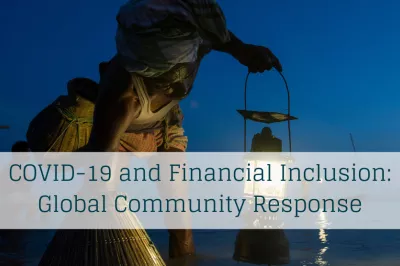
Global Community Response to COVID-19
A list of organizations offering resources and insights on COVID-19 & microfinance
FinDev Coronavirus Data Tracker
Data relevant for financial inclusion - find out who is tracking what
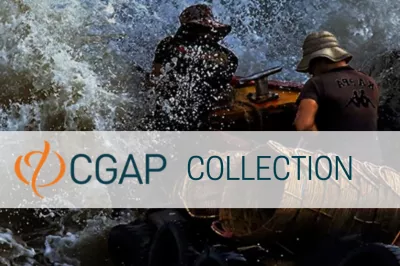
New Data Source
View our complete Data Tracker listing most important sources and trackers by the level of their relevance to the sector.
COVID-19 and MSMEs: Data and Analysis to Understand Impact
In June 2020, CFI began a longitudinal survey examining how COVID-19 is impacting MSMEs in four countries: Colombia, India, Indonesia, and Nigeria. Users of this interactive data dashboard can explore how MSME owners are responding to the crisis, and they can dive deeper to view results of the survey based on different market segments – including men and women, firms of different size, and different types of businesses.
Recent Publications
The Liquidity Challenge for Pakistan’s Microfinance Banks
M-CRIL | Sep 2020
Social Assistance Payments in Response to COVID-19: The Role of Donors
CGAP | Sep 2020
COVID-19 and Remittance Flows in Nepal: Potential Turning Point for Development
Center for International Private Enterprise | Sep 2020
Has the Pandemic Spared Cambodia? Liquidity Considerations of Cambodia’s Large MFIs
M-CRIL | Sep 2020
Why the Economic Response to COVID-19 Needs to Be Financially Inclusive and Gender Sensitive
Alliance for Financial Inclusion | Sep 2020
The Impact of COVID-19 on Small and Medium-sized Enterprises: Evidence from Two-wave Phone Surveys in China
Center for Global Development | Sep 2020
The COVID-19 Client Interview Tool for Financial Service Providers
Social Performance Task Force (SPTF) | Apr 2020
View All Publications Related to COVID-19 >
Blogs & Opinion
If you have a blog idea and would like to write for the FinDev Blog, please review our guidelines. We do not cross-post blogs that have been published elsewhere, but if you wish to share an existing blog post in our next FinDev COVID-19 Update, you can send it to us using our contact form.
Reflections on the Future of Financial Inclusion
COVID-19: Burden or Boon for Financial Inclusion?
22 Sep 2020 | Robin Newnham | NextBillion
Implications of COVID-19 for the Most Vulnerable: A Snapshot of Views from CFI’s Advisory Council
17 Sep 2020 | Camilla Nestor, Mark Pickens, Joanna Ledgerwood & David Ferrand | CFI-Accion
Can Africa Really ‘Build Back Better’? How Financial Inclusion Must Evolve To Enable a COVID-19 Recovery
15 Sep 2020 | Sarah Goodier & Karen Kühlcke | NextBillion
Investment
DFIs, Financial Inclusion and the COVID-19 Response: A Q&A with Machal Karim of CDC
22 Sep 2020 | Machal Karim | CFI-Accion
Support for Clients
Common Measures to Help Small Businesses During COVID
21 Sep 2020 | Erica Bosio, Emilia Galiano, Marko Grujicic & Joseph Lemoine | World Bank
Client Protection Under COVID
13 Sep 2020 | Frances Sinha | Boulder Institute of Microfinance
Supporting Migrants and Remittances as COVID-19 Rages On
11 Sep 2020 | Saad Noor Quayyum & Roland Kangni Kpodar | IMF
Socioeconomic Impact
Youth Saving and Spending During COVID-19: Tracking Young People’s Financial Activity in Nigeria
17 Sep 2020 | Mahlet Alemayehu | NextBillion
Tracking the Socioeconomic Impacts of the Pandemic in Nigeria: Results From the First Three Rounds of the Nigeria COVID-19 National Longitudinal Phone Survey
16 Sep 2020 | Gbemisola Oseni, Amparo Palacios-lopez, Kevin Mcgee & Akuffo Amankwah | World Bank
MSMEs in Indonesia Are Surviving but COVID-19 Leaves Little Margin for Error
10 Sep 2020 | Eric Noggle | CFI-Accion
Webinar Recordings
Using Customer Insights to Drive Your Crisis Response: A Conversation with BRAC International and Ujjivan (India)
30 Jun 2020 | Social Performance Task Force (SPTF)
Investing in Agriculture During the COVID-19 Crisis: Perspectives From the Impact Finance World
02 Jun 2020 | The Smallholder and Agri-SME Finance and Investment Network (SAFIN)
View All Upcoming Events Related to COVID-19 >
News
COVID-19: 97 Percent of Small-Scale Farmers in Uganda Register a Decline in Earnings
| Eagle Online | Uganda
Top Two Solutions From the COVID-19 Financial Health Challenge
| United Nations Capital Development Fund (UNCDF) | Global
View All News Related to COVID-19 >
Quick Links:
FinDev Guide
About this guide
Published
Topics
Contributed by a global financial inclusion community member. Share your lessons learned
Write for usLeave a Comment
Comments on this page are moderated by FinDev Editors. We welcome comments that offer remarks and insights that are relevant to the post. Learn More
